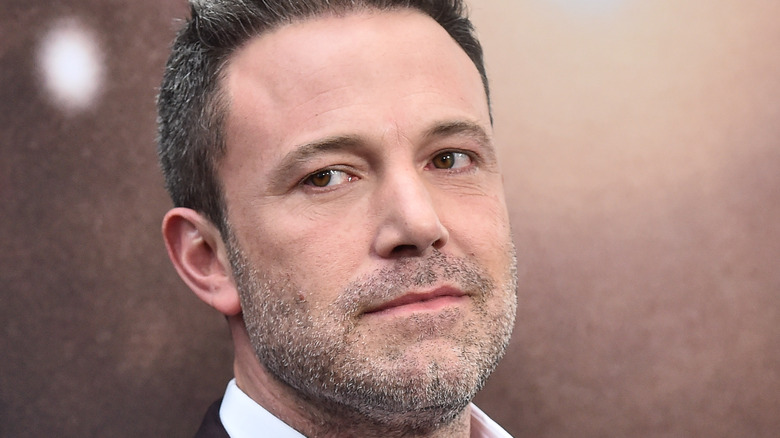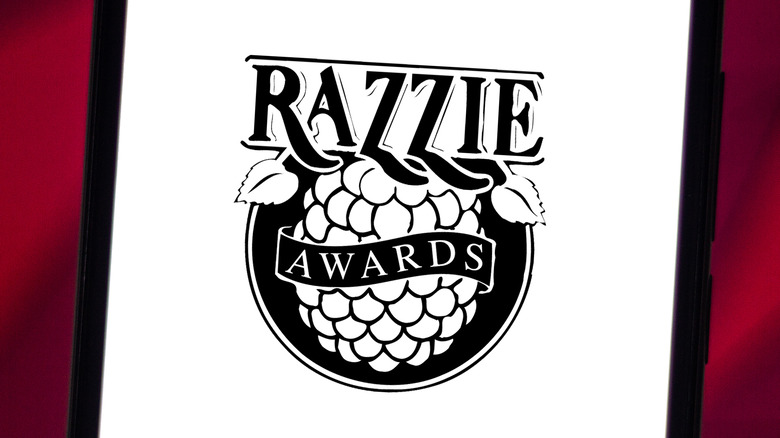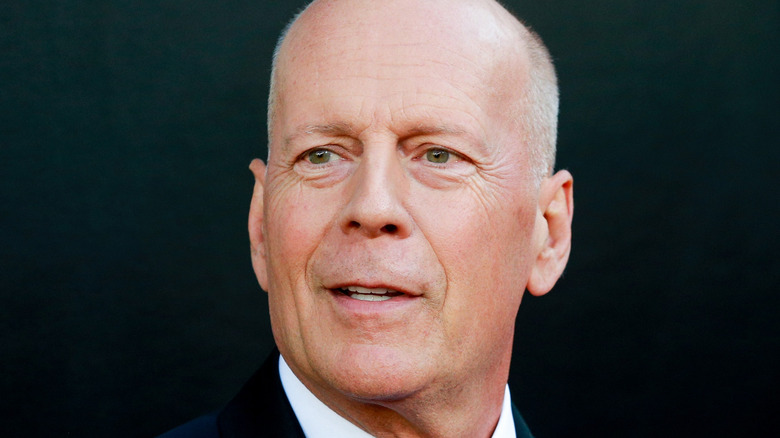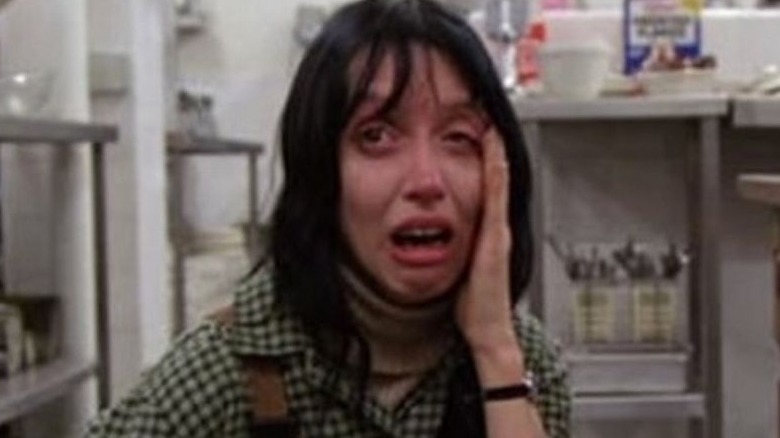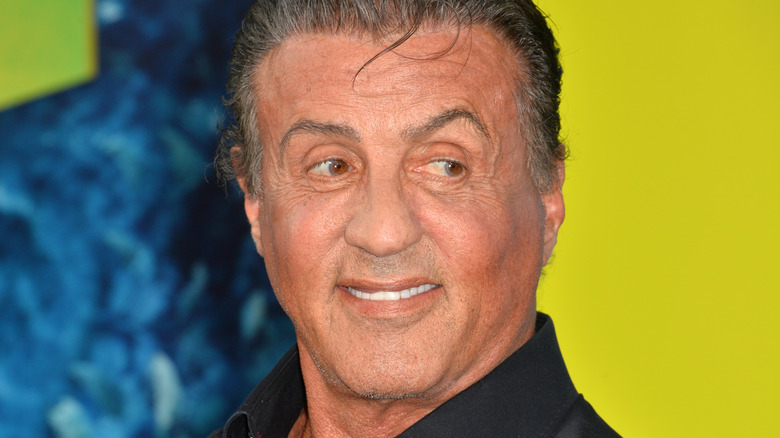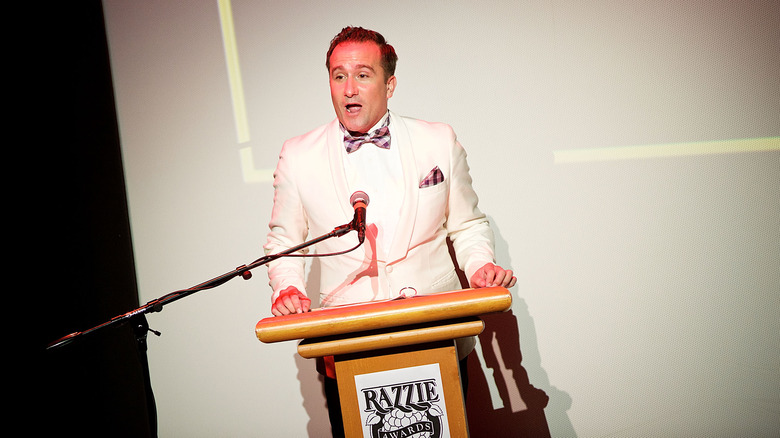Biggest Controversies Surrounding The Razzies
In 1980, John Wilson saw a double feature of two movie musicals, "Xanadu" and "Can't Stop the Music." Both were also among the worst-reviewed movies of the year, and Wilson agreed with the critical assessment, telling Time that he tried to get back the 99 cents he paid for admission. Instead, the back-to-back viewing of bad films inspired what would become Wilson's life's work — co-creating and running the Golden Raspberry Awards, or the Razzies, an annual celebration of and thorough takedown of each year's worst movies and cinematic performances. Like the Academy Awards of bad movies, the Razzies are handed out each year the day before the Oscars in categories like worst picture, worst actor, worst actress, and worst screenplay.
Throwing all that vitriol and speaking truth to power for seemingly out of touch or incompetent Hollywood figures is bound to cause some scandal. Every few years, the negative publicity generated by the Razzies turns inward, and the ceremony and organization itself becomes the subject of shameful attention. Here are all the most scandalous moments in the 40-plus-year history of the Razzie Awards.
Were the 2019 Razzies rigged?
In 2019, entertainment industry trade publication The Hollywood Reporter received an anonymous tip from a Razzies voter about glaring irregularities in that year's Razzie Awards nomination figures. (To attain that right, according to Vulture, one must pay a $40 fee once, and that's it.) "The guy who runs the Razzies left the ballot results open after the voting ended," the tipster said, pointing out that the official list of nominees included multiple films and acting performances that, according to the vote tallies, didn't get nearly enough votes to gain that designation. The source went on to state that they believe co-founder John Wilson made decisions as he wanted.
The voter showed documentation that proved "The Meg" was coming in 11th place in voting for the worst remake, rip-off, or sequel category, but received a slot as one of the final five nominees, while top vote receiver "Fifty Shades Freed" wasn't nominated at all. Frequent Golden Raspberry Awards targets Bruce Willis (for "Death Wish") and Johnny Depp ("Sherlock Gnomes") didn't get much voter attention but were nominated for worst actor anyway over the highly tallied Kevin Spacey ("Billionaire Boys Club") and Jamie Dornan "Fifty Shades Freed."
Wilson tried to explain away the controversy by calling the source a disgruntled voter who claimed that there had been some technical difficulties with the voting machinery.
Sorry, Bruce Willis
It's been a few years since Bruce Willis was the star of massive hits and classic films like "Die Hard," "The Sixth Sense," and "Pulp Fiction." In 2010, he pivoted to staring in many direct-to-video action flicks. The Razzie Awards, who have twice given Willis its worst actor prize, commemorated this descent into B-movies by creating an entirely new category for its 2022 ceremony: worst performance by Bruce Willis in a 2021 movie, per CNN. Willis appeared in so many quickly-made flicks in the previous year that the category was populated by eight films, including "Apex," "Cosmic Sin," "Fortress," and "Out of Death."
Just after those Razzie nominations were revealed, Willis' daughter, Rumer Willis, announced on social media accounts that her father would be retiring from acting. "Our beloved Bruce has been experiencing some health issues and has recently been diagnosed with aphasia, which is impacting his cognitive abilities." In the wake of the announcement, Razzie co-founders John Wilson and Mo Murphy released a statement to TheWrap, defending the Willis category. "Whoever handles Willis' affairs should probably not have permitted him to do such a high volume of work in such a short time, especially if they were aware of his situation," they said in part. "It should also be pointed out that the 'Bruce Willis' category was specific to 2021. We never intended it to be an on-going category." One day later, the Razzies announced (via CNN) that they'd pulled and canceled the Bruce Willis category entirely.
Ben Affleck's Razzie nomination angered the internet
"The Last Duel," directed by three-time Academy Award-nominated director Ridley Scott, scored well with critics in 2021, earning an 85% rating on Rotten Tomatoes. And yet, when the Razzie Award nominations for 2021 were released in February 2022, the film earned a single nod, in the worst supporting actor category for Ben Affleck. It wasn't nearly the first time the Razzies focused on Affleck — his nomination for "The Last Duel" was his 11th overall, and he's picked up a few trophies for his work in "Batman v. Superman: Dawn of Justice" and "Gigli."
It seemed as if the Razzie Awards were picking on Affleck just for the sake of keeping up the tradition of teasing the actor, regularly nominated at the ceremony since 1999. The Razzies briefly went viral on Twitter in February 2022, with Affleck fans and defenders calling out the bad movie-skewering organization. For example, film critic Bilge Ebiri tweeted, "F*** the Razzies. Forever," while screenwriter Kevin Lehane wrote, "The Razzies nominated Ben Affleck for 'The Last Duel' thus proving they don't watch the films they s*** on."
The Razzies got it wrong with The Shining
For the most part, each year the Razzie Awards pick on low-hanging fruit. The recipients of the worst movies of the year prizes are almost always widely critically derided cinematic disasters, such as "Cats," "Howard the Duck," "Showgirls," and "The Postman." But at the very first Razzies ceremony in 1981, mocking the films of 1980, the organization's nomination of "The Shining" in many major categories was questionable if not baffling. Stanley Kubrick received a nod for worst director, and Shelley Duvall landed in the worst actress category. But "The Shining" is not regarded as a bad movie, as it was honored with several quality film awards and has enjoyed near-universal critical acclaim.
The Razzies received some blowback for nominating Kubrick and Duvall. "We still get 'called on the carpet' for that nomination by movie buffs and cineastes four decades later," Razzies co-founder John Wilson wrote on the Razzies blog in 2020, explaining that voters singled out "The Shining" because it compared unfavorably to Stephen King's source novel and excised several important scenes.
In 2022, the Razzies actually took back Duvall's nod, after learning of the director's reportedly vicious behavior toward the actor on the set of the film. "Duvall's performance was impacted by Stanley Kubrick's treatment of her throughout the production," Wilson said in a statement. "We would like to take this opportunity to rescind that nomination."
Sylvester Stallone fired back at the Razzies
The all-time most-celebrated (or humiliated) performer in Razzie Awards history is Sylvester Stallone, a 34-time nominee for his acting, directing, and screenwriting and a 10-time winner. Among his achievements: worst actor of the century (for the 20th century), worst actor of the decade (for the '80s), and recipient of the worst actor, worst director, and worst screenplay prizes for 1985's "Rambo: First Blood Part II." The Razzies have historically piled it on to such a degree that when Stallone was nominated for an Academy Award for his role in "Creed" in 2015, the bad movie organization gave him a special "redeemer award."
But before that, Stallone didn't accept the constant Razzies razzing with good humor. "When he heard he was up for worst actor of the century we did get a voicemail that sounded like him — for legal reasons we can't say it was him," Razzies co-creator John Wilson told Vanity Fair. "But his point was my movies make money, stop picking on me. And you're not exempt from the Razzies if your movie made money."
Do the Razzies still matter?
John Wilson and Maureen Murphy created the Razzie Awards in the early 1980s, a very different time period from the present day, in terms of culture and media consumption. There were scarcely more than three television networks, a handful of gigantic movie studios controlled the film industry, and there was no internet. It was a monoculture with little room for multiple voices or points of view, and Americans had relatively few choices when it came to pop culture. The Razzies came along in 1981 and criticized this system, speaking up against Hollywood, as if to say that the people would not necessarily accept and pay for whatever movies it put out if those movies were abjectly and objectively terrible.
By the 2010s, with the rise of indie film, social media, and hundreds of methods by which one can screen thousands of choices — and then talk about it loudly and thoroughly on social media — the entertainment world had changed, so much so, cultural critics started to wonder if the Razzie Awards were still relevant, necessary, or funny. Benjamin Lee of The Guardian wrote in 2018 that the Razzies still seemed to operate from Wilson's personal vendettas, often ignoring a film or performer's suitability for the award and rather focusing on easy targets. "Sure 'Zoolander 2' was bad but giving Kristen Wiig a worst supporting actress award for her incredibly funny, scene-stealing turn makes no sense," Lee suggested.
